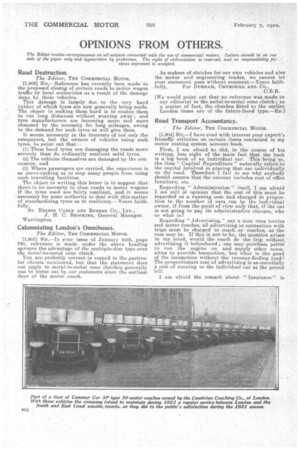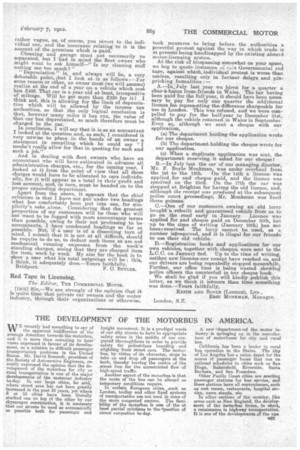OPINIONS FROM OTHERS.
Page 24

Page 25

If you've noticed an error in this article please click here to report it so we can fix it.
Road Destruction.
The Editor, THE COMMERCIAL MOTOR.
[1,902] Sir,—Reference has recently been made to the proposed closing of certain roads to motor wagon traffic by local authorities as a result of the damage done by these vehicles. This damage is largely due to the very hard rubber of which tyres are now generally being made. The object in making them hard is to enable them to run long distances without wearing away ; and tyre. manufacturers are becoming more and more obsessed by the necessity for long mileages, owing to the,demand far such tyres as will give them.
It seems necessary in the interests of not only the ratepayers, but the owners of vehicles using such tyres, to point out that : (1) These hard tyres are damaging the roads more severely than do ordinarily resilient solid tyres.
(.2) The vehicles themselves are damaged by the concussion, and (3) Where passengers are carried, the experience is so nerve-racking as to stop many people from using such travelling facilities.
The object in writing this letter is to suggest that there is no necessity to close roads to motor wagons if the tyres used are fairly resilient, and it seems .necessary for some authority to deal with this matter of standardizing tyres as to resiliency.—Yours faithfully, J. H. C. BROOKING, General Manager. Warrington.
ST. HELENS CARLE AND RUBBER CO., LTD.,
Calumniating London's Omnibuses:
The Editor, TEE COMMERCIAL MOTOR.
[1,903] Sir,—In your issue of January 24th, page 780, reference is made under the above heading apropos the advantage of the multiple-disc type over the metal-to-metal cone clutch.
You are probably correct in regard to the particular chassis mentioned, but that the statement does not apply to metal-to-metal cone clutches generally can be borne out by our customers since the earliest days of the motor coach. As makers of clutches for our own vehicles and also the motor and engineering trades, we cannot let your statement pass without comment. —Yours faith
fully, For DURHAM, CHURCHILL AND CO.,
[We would point out that no reference was madein our editorial to the metal-to-metal cone clutch ; as a matter of fact, the clutches fitted to the earlier London buses are of the fabric-faced type.—ED.1
Road Transport Accountancy.
The Editor, THE COMMERCIAL MOTOR.
[1,904] Sir,—I have erad with interest your expert's friendly criticism on certain items contained in my motor costing system account book.
First,. I am afraid he did, in the course of his writing, lose sight of the main fact that the book is a-log book of an individual car. This being so, the item "Capital Expenditure " naturally refers to the capital involved in placing that car individually on the road. Therefore I fail to see why anybody should assume that the amount includes cost of office furniture, etc.
Regarding " Administration" itself, I am afraid I am still of opinion that the cost of this must be regarded as a running cost and charged in proportion to the number of cars run by the individual owner, if from the point of view only that, if the car is not going to pay its administrative charges, who or what is?
Regarding "Advertising,' say a man runs lorries arid motor coaches, all advertising in connection with trips must be charged to coach or coaches, as the case may be. If this is not to be, the question arises in my mind, would the coach do the trip without advertising it beforehand ; one may purchase petrol to run the engine on and supply other necessities to provide locomotion, but what is the good of the locomotion without the revenue-finding load? • The proportionate cost of advertising is as essentially a cost of running to the individual car as the petrol bill.
I am afraid the remark about " Insurance" is rather vague, as, of course, you revert, to the individual car, and the insurance relating to it is the amount of the premium which is paid. Cleaning and garage must not necessarily bo separated, but I had in mind the fleet owner who might want to ask himself—" Is my cleaning staff costing me too much?"
"Depreciation" is, and always will be, a very debatable point, tbut I look at it as follows :—For some reason or other, an owner must (we will assume) realize at the end of a year on a vehicle which cost him 2400. That car is a year old at least, irrespective of mileage. Will he get more than £320 for it? I think not, this is allowing for the limit of depreciation which will be allowed by the income tax authorities, so that the only logical conclusion is that, however many miles it has run, the value of that car has depreciated, so much therefore must be charged to the car.
In conclusion, I will say that it is as an accountant
I looked at the question and, as such, I considered it very unwise to place in the hands of an owner a statement in compiling which he could say "I needn't really allow for that in quoting for such and such a
And in dealing with fleet owners who have an accountant who will have estimated in advance all administrative charges, etc., for the coming year, I looked at it from the point of view that all these charges would have to be allocated to ears individually, for it will appear as a total in their profit and loss account, and, in turn, must be handed on to the proper expending department. Apart from the above, it appears that the chief criticism is that I have not put under two headings what has comfortably been put into one, for simplicity's sake alone. Considering that the greatest proportion of my customers will be those who will not want to be fogged with more accountancy terms than possible, owing to their not professing to be accountants, I have condensed headings so far as possible. But, if a user is of a dissecting turn of mind, I submit that it is not at all difficult, should he require to do so, to deduct such items as are not mechanical running expenses from the week's standing charges, seeing that they are charged item for item, week by week. My aim for the book is to show a user what his total outgoings will be ; this, I think, it adequately dc-es.--Yours faithfully,
Bridport. F. 0. BUTLER.
Red Tape in Licensing.
The Editor, THE POMMERCIAL MOTOR.
[1905] Sir,---We are strongly of the opinion that. it is 'quite time that private car owners and the motor industry, through their organizations or otherwise,
took measures to bring before the authorities a powerful protest against the way in which. trade is at present being handicapped by the existing absurd motor-licensing system. At the risk of trespassing somewhat on your space,
we beg to quoteinstances ,;.,7;,1 Governmental red tape, against which, individual protest is worse than useless, resulting only in further delays and pinpricking formalities: A.—Injuly last year we hired for a quarter a ehar-&-banes from friends in Wales. The tax having been paid for the full year, it should have been necessary to pay for only one quarter the additional licence fee representing the difference chargeable for use in London. This was refused, and we were compelled to pay for the half-year to December 31st, although the vehicle returned. to Wales in September. Even so, although we sent a cheque with our application,
(a) The department holding the application wrote for our cheque.
(b) The department holding the cheque wrote for our application.
(c) When a duplicate application was sent, the department reeeiving. it asked for our cheque.'
B.—In July last the ear of our managing director, Mr. F. Boyle 3/Ionkoaan, was under overhaul from the 1st to the 12th. On the lath a licence was applied for and cheque paid, and the licence was receiVed on -the 23rd. On the 17th the car was stopped at Brighton for having the old licence, and, althouglr the receipt was produced at the subsequent. police court proceedings, Mr. Monkman was fined three guineas.
C.—One of our customers, owning an old lorry bought a rebuilt and guaranteed vehicle from us to go on the road early in January. Licence was applied for and cheque paid on December 30th, but up to the time of writing (January 10th) has not been*reoeived. The lorry cannot. be used, as a number isirequired, and it is illegal for our friends to use their old vehicle.
D.—Registration books and applications for our own vehicles, together with cheque, were sent to the L.C.C. on January 2nd. Up to the time of writing, neither new licencesaaor receipt have reached us and our drivers are being repeatedly stopped meanv:^hile. Further, our office time is being wasted showing police officers the counterfoil in our cheque book. We shall be glad if you will kindly *publish this letter, as sie think it isimore than time something was done.—Yours faithfully,
KEITH AND BOYLE c.4,0NDON), LTD., ERIO ONAMAN, Manager. London, S.E.




























